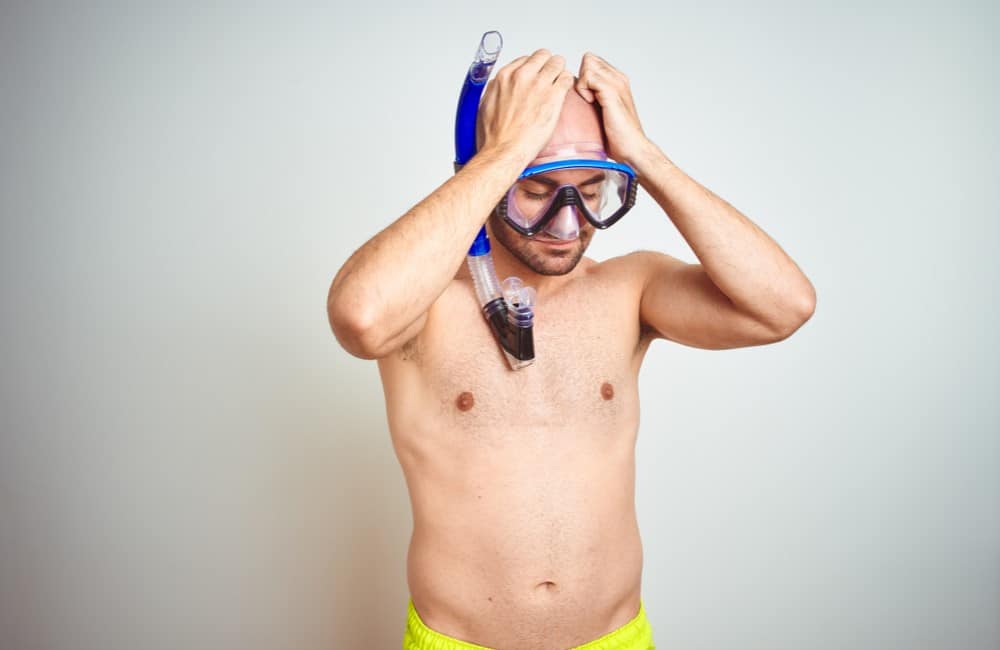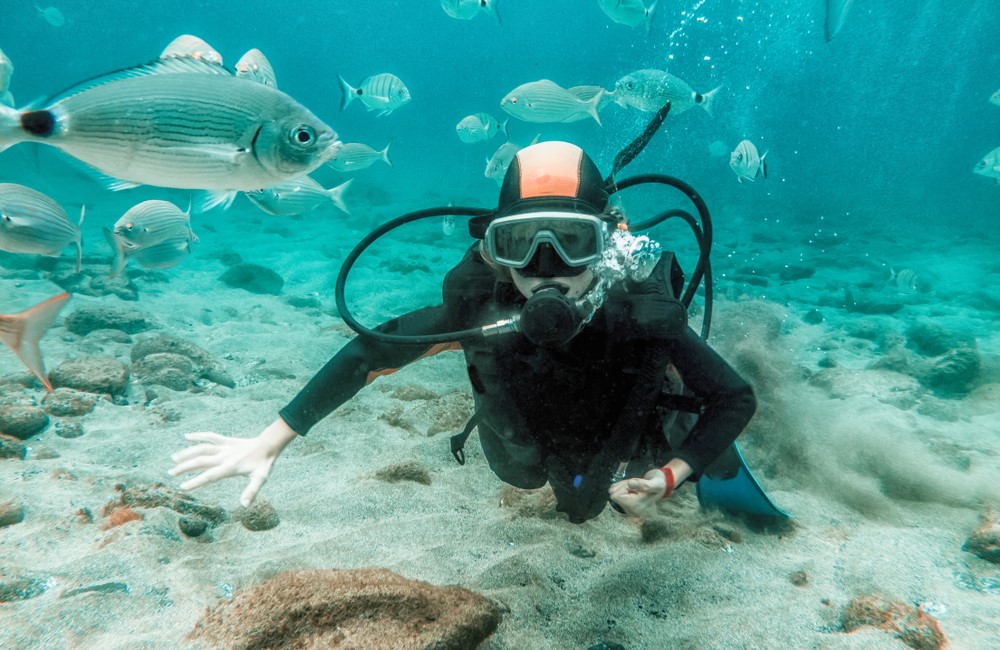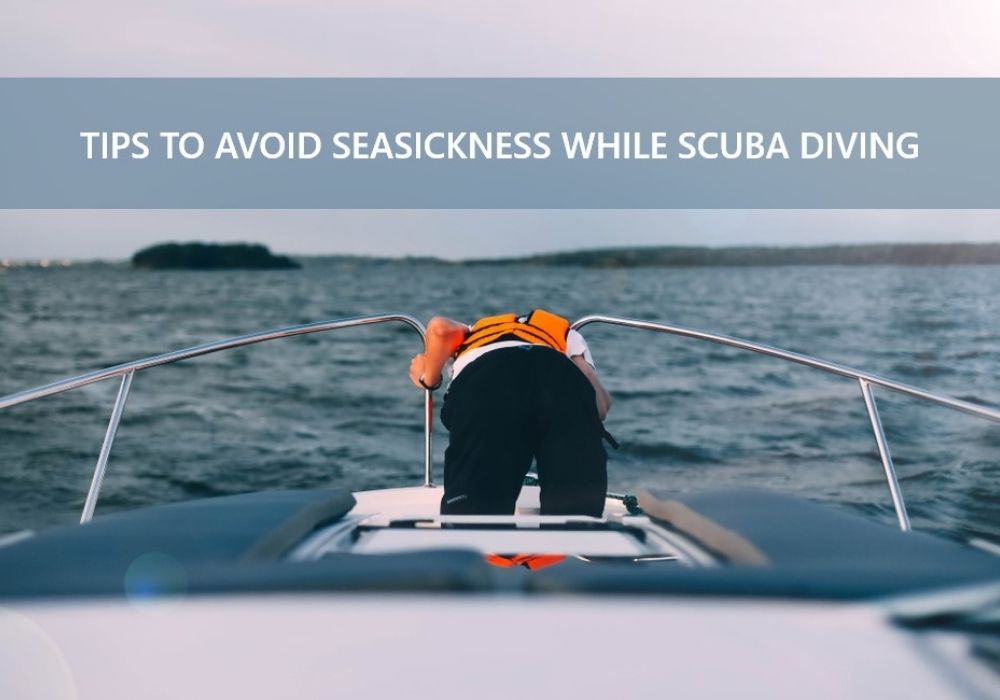Scuba diving is an invigorating and exciting way to explore the underwater world. However, for some people, scuba diving can also be a source of seasickness. Seasickness is caused by the motion of the waves and can result in nausea, vomiting, and dizziness.
While seasickness can be a nuisance, there are a number of ways to prevent it. For example, many divers find that eating a light meal before diving can help to minimize symptoms. In addition, some divers use anti-motion sickness medications or ginger supplements to prevent seasickness. And finally, it is important to drink plenty of water before and after diving to stay hydrated.
By following these simple tips, scuba divers can enjoy a safe and sickness-free diving experience. Now, let’s delve into the causes of seasickness, the important information related to it, the cure, and what you should do in case of severe seasickness:
What Causes Seasickness?

Seasickness is a condition that is caused by the motion of the waves. It can occur while scuba diving, sailing, or even just sitting in a boat. The symptoms of seasickness include nausea, vomiting, and dizziness. The cause of seasickness is not fully understood, but it is thought to be related to the inner ear. When the waves move, they can cause the fluid in the inner ear to become dislodged. This can lead to a feeling of nausea and vomiting.
Seasickness is more common in people who are not used to being on the water. However, it can affect anyone at any time. There are some things that you can do to help prevent seasickness. These include getting plenty of rest before you go out on the water, eating light meals, and avoiding alcohol. In addition, some prescribed medications can help relieve the symptoms if you start to feel seasick.
How Can I Prevent Seasickness When Diving?

Seasickness is a form of nausea often caused by a boat’s motion. It can also be caused by the movement of the water when diving. Divers who are susceptible to seasickness may experience symptoms such as dizziness, sweating, and vomiting. There are a few things that you can do to prevent seasickness while diving.
First, it is important to eat a light meal before diving. Heavy meals can often worsen the symptoms of seasickness. Second, you should avoid caffeine and alcoholic beverages before diving. These substances can increase the chance of experiencing nausea and vomiting. Finally, it is important to stay hydrated. Dehydration can exacerbate the symptoms of seasickness.
If you follow these simple tips, you should be able to dive without feeling nauseous or sick; however, if you do start to feel seasick while diving, there are a few things that you can do to relieve the symptoms.
First, try to get out of the water and rest in a shady area. Second, drink plenty of fluids (preferably clear liquids) and eat light, bland foods. Finally, if you have access to medication, several prescribed options can help to relieve seasickness. With a little bit of preparation, you can enjoy your dive without feeling sick or uncomfortable.
Medication
Seasickness is a common problem for many divers and can ruin an otherwise perfect day underwater. There are a few different ways to prevent seasickness, including medication. There are a couple of different types of medication that can be effective in preventing seasickness.
The first is motion sickness medication, which can be taken before diving. The second type is scopolamine, which is a patch that is applied to the skin. Scopolamine works by blocking the nerves that send signals to the brain that control vomiting.
Talking to a doctor before taking any medication is important, as there can be side effects. For example, motion sickness medication can make people drowsy, and scopolamine can cause dry mouth and blurred vision. However, both medications can be very effective in preventing seasickness while diving.
Medicated Patches
Scopolamine is a medication used to treat nausea and vomiting. It is also used to prevent seasickness while scuba diving. Scopolamine belongs to the group of medicines called anticholinergics. Anticholinergics work by blocking a certain natural substance (acetylcholine).
This action helps decrease stomach contractions and slows food movement through the stomach. Scopolamine is available in common form. Basic drugs frequently cost less than the brand-name variety. In some cases, they may not be available in all strengths or forms as the brand-name drug.
Non-Medicated Patches
While scuba diving, it is important to be aware of the risk of seasickness. This condition can cause a number of symptoms, including nausea, vomiting, and dizziness. In severe cases, it can even lead to unconsciousness. Non-medicated patches are one method that can be used to help prevent seasickness. These patches work by releasing a small amount of medication into the bloodstream.
The medication helps to regulate the body’s response to the motion, reducing the symptoms of seasickness. Non-medicated patches are available without a prescription and can be easily applied before diving. However, following the instructions carefully and removing the patch immediately if any side effects occur is important.
How Can I Comfort My Seasickness at the Moment?
While scuba diving, you may experience seasickness due to the change in pressure and the movement of the waves. If you start to feel sick, you can do a few things to ease your seasickness. First, try to stay calm and breathe slowly and evenly.
Second, focus on a fixed point in the distance and avoid looking down at the water. Third, drink plenty of fluids and eat ginger or Id if you have them. Finally, if you start to feel dizzy or nauseous, exit the water immediately and rest on solid ground. Following these tips can help prevent or lessen the severity of seasickness while scuba diving.
Can Seasickness Prevent Me from Scuba Diving?
Many people worry that seasickness will prevent them from enjoying scuba diving, but there are a few things to keep in mind. First, it’s important to remember that seasickness is caused by the movement of the boat, not the water.
This means you’re much less likely to experience seasickness while scuba diving than on a boat. Second, even if you do start to feel seasick, there are a few ways to combat it. Taking ginger supplements or wearing acupressure wristbands can help to ease nausea. Finally, if all else fails, you can always take a break and float on the surface for a while until the feeling passes.
While seasickness can be a common occurrence for those who are new to scuba diving, it doesn’t have to prevent you from enjoying this activity. Instead, seasickness is caused by the conflict between what your eyes see and what your body feels. For example, when you’re on a boat, your eyes tell your brain that you’re moving, but your inner ear doesn’t sense this movement. This discrepancy can cause nausea and vomiting.
However, you can do a few things to minimize the effects of seasickness while scuba diving. First, make sure to eat a light meal before diving and avoid alcohol. Second, try to stay focused on the underwater scenery and movements around you. And finally, if you start to feel nauseated, let your instructor know so they can help you surface safely. With a little precaution, seasickness doesn’t have to ruin your scuba diving experience.
What Must I Prepare If I Sense Bizarre Submerged?

Seasickness is a common problem among scuba divers, especially those who are new to the sport. The good news is that diving is possible even if you feel seasick, but what to do if you have fallen sick underwater?
The key is always to keep your regulator or controller in your mouth. Doing this will prevent you from swallowing water and becoming sicker. In addition, taking things slowly at first and avoiding strenuous activity is important. If you start to feel dizzy or lightheaded, stop what you are doing and rest until you feel better. Then, with a little time and patience, you should be able to enjoy diving even if you are prone to seasickness.
Although it may seem counter-intuitive, one of the best ways to avoid getting seasick while you are underwater is to eat a light meal beforehand. Avoiding spicy or greasy foods can help, as can drinking plenty of water.
If you do start to feel nauseous, it’s important to try to relax and take slow, deep breaths. And if you vomit, keep your regulator in place so you don’t accidentally inhale water. Although it may not be pleasant, following these precautions can help you avoid any serious safety hazards.
Dealing with seasickness while you are underwater can be a challenge. If you are feeling nauseous, it is important to try to stabilize yourself so that you don’t vomit while underwater. Hold onto a buddy or a sturdy object, and make sure to keep your regulator in your mouth.
If you do vomit, it is important to get rid of the vomit as quickly as possible so that you don’t accidentally swallow it. Breathe slowly and evenly and try to relax. With some effort, you should be able to overcome seasickness and enjoy your dive.
Divers know that losing your lunch mid-dive is not only embarrassing but can also be dangerous. Suppose you vomit while diving. You can do a few things to minimize the risk to yourself and those around you. First, try to keep your mouth closed as much as possible.
Second, if you are using a full-face mask, make sure to close the purge valve so that the vomit doesn’t end up inside your mask. And finally, if you are diving with a buddy, signal to them that you are vomiting and stay close to them so they can keep an eye on you. Vomiting while diving may not be pleasant, but with little preparation, it doesn’t have to be dangerous.
Throwing up is never fun, but sometimes it’s unavoidable. If you’re unfortunate enough to have to purge, there are a few things you can do to make the experience less unpleasant. First, try pressing the purge button while you’re vomiting. This will help to flush the reg out of your system a little better.
It’s a good idea to keep your food close by so you can make sure that no fish get too comfortable around it. The underwater residents love human leftovers and will often come up for seconds! And finally, remember that this experience is only temporary and that you’ll eventually feel better.
Conclusion
Scuba diving is an amazing experience that everyone should have the opportunity to enjoy. However, for some people, the thought of diving can be marred by the fear of getting seasick. If you’re one of those people, don’t worry!
You can do a few things to avoid feeling sick while scuba diving. First, make sure to get plenty of rest before your dive. A tired body is more likely to feel nauseous than a well-rested one. Second, eat a light meal before diving. A heavy meal can make you feel sluggish and increase your chances of getting sick. Third, take seasickness medication if necessary.
If you’ve been prone to seasickness in the past, it’s better to be safe than sorry. Fourth, breathe deeply and slowly while diving. Rhythmic breathing will help calm your nerves and keep your mind off the waves. Finally, focus on something else besides the waves.
If you can keep your mind occupied with something else, you’re less likely to notice the motion of the water and feel sick as a result. By following these tips, you should be able to avoid seasickness and enjoy your dive!
